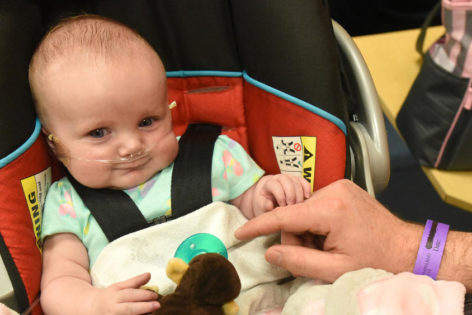
Stem Cell Treatment for Baby Girl May be Answer to Treating Heart Disease
20/03/2018


Right now, around 64,000 people in the UK are being treated for kidney failure

There are almost 30,000 people on dialysis in the UK

There are 40-45,000 premature deaths in the UK every year due to Chronic Kidney Disease CKD

Mortality rates for liver disease have increased 400% since 1970

3 people in the UK die each day waiting for a transplant
Source: Kindey Care UK, NHS England,
Worldwide, the kidneys are the most commonly transplanted organs, followed by the liver and then the heart. Corneae and musculoskeletal grafts are the most commonly transplanted tissues; these outnumber organ transplants by more than tenfold.
Kidney failure and liver failure therefore represent the most significant areas of organ transplant medicine.
Kidney disease is usually caused by other conditions that put a strain on the kidneys. Often it’s the result of a combination of different problems. These can include high blood pressure, diabetes, high cholesterol, kidney infections, blockages in the urinary flow, or hereditary conditions such as polycystic kidney disease, where growth called cysts develop in the kidneys.
Kidney disease, is also known as nephropathy or renal disease. Nephritis is inflammatory kidney disease. It can be diagnosed by blood testing. Whilst Nephrosis is noninflammatory kidney disease. Kidney disease of any kind usually causes kidney failure to some degree, with the amount depending on the type of disease.
Liver failure can be as a result of a number of conditions including Hepatitis B, Hepatitis C, long-term consumption or cirrhosis or inherited disorders such as hemochromatosis (where the body absorbs and stores too much iron).
In severe cases such as Chronic Kidney Disease (CKD) or Chronic Liver Disease (CLD) often the only available remaining outcome is transplantation.
Transplantation medicine is one of the most challenging and complex areas of modern medicine. Some of the key areas for medical management are the problems of transplant rejection. This is where the body has an immune response to the transplanted organ, possibly leading to transplant failure and the need to immediately remove the organ from the recipient.
This type of rejection is known as Graft-versus-host disease (GvHD) and relates medical complications following the receipt of transplanted tissue from a genetically different person.
Traditionally this risk of transplant rejection has been reduced through serotyping to determine the most appropriate donor-recipient match and through the use of immunosuppressant drugs.
Though it is now recognised that one significant advantage of an autologous stem cell transplant (using the individuals own stem cells) is that the body recognizes the cells and therefore does not reject or attack them. In addition, autologous transplants have the added advantage of avoiding the sometimes difficult process of finding a donor for stem cell treatment.
Worldwide the requirements for liver and kidney transplant operations are increasing and the numbers of available and suitable donors does not always keep pace with the demand. In the UK there are approximately 37,800 patients with end-stage renal failure. Nearly 21,000 are on dialysis, whilst the remainder have a transplant. Whilst there was a 6% increase in the number of deceased donors, in 2016, to 1,364, the highest number ever in the UK, the number of living donors fell by 2% to 1,075, accounting for approximately half of the total number of organ donors. This meant that the total number of patients whose lives were saved or improved by an organ transplant increased by 4% to 4,601, however the total number of patients registered and waiting for a transplant at the end of March 2016 stood at 6,476 patients.
A similar picture exists with liver disease which remains the only major cause of death still increasing year-on-year and is the fifth ‘big killer’ in England & Wales, after heart, cancer, stroke and respiratory disease. Approximately 16,000 people in the UK die from liver disease every year.
However, these statistics are not comprehensive, due to two major reasons for under recording: the stigma associated with liver disease and attempts to avoid distress to the bereaved, and attribution of liver deaths to other diseases as liver disease frequently causes multiple organ dysfunction.
Research Into Stem Cell Treatment
In recent years stem cell therapy, also known as regenerative medicine, has promoted the reparative response of diseased, dysfunctional or injured tissue using stem cells or their derivatives. For many it is the next chapter of organ transplantation and the use of cells instead of donor organs, which are limited in supply, is becoming more of a reality.
For example, scientists have already made pieces of human liver from stem cells and, by transplanting them into mice, have shown they behave like healthy organs.
The work marks a world first for the field of regenerative medicine, which to date had promised so much but until this point had failed to produce the major achievement of a complex organ that connects to a recipient’s blood supply.
The feat has bolstered hopes that stem cells will lead to revolutionary therapies that are less dependent on donors, by repairing or replacing damaged organs with tissue grown fresh in the laboratory.
Experts agree that this breakthrough could transform the treatment of many patients with liver failure, though it may not be ready for clinics for another 10 years, the scientists said.
Protect Their Future Health
If you want more information on how you could bank your children’s baby teeth for potential future therapeutic use, have a chat to one of our team or download our guide to stem cell banking.
For more information on the latest breakthroughs in stem cell therapies and treatments see our news articles.

20/03/2018

09/09/2017

28/12/2016

12/09/2016